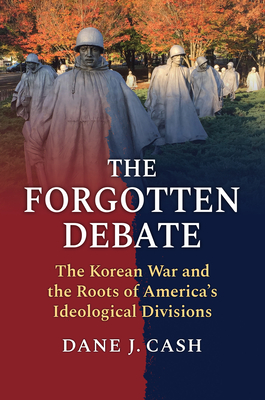The Forgotten Debate: The Korean War and the Roots of America's Ideological Divisions

The Forgotten Debate: The Korean War and the Roots of America's Ideological Divisions
A deeply researched political history that finds a new origin story to today's deeply entrenched partisanship. Cash reminds us that the "forgotten war" in Korea was also the occasion for the "forgotten debate" between liberals and conservatives.
When it comes to the origins of today's sharp partisan divide, most have pointed to the usual suspects--Newt Gingrich's Republican Revolution in 1994, Watergate, and the Vietnam War. In The Forgotten Debate, Dane J. Cash suggests that we need to look further back in history. He argues that we can trace the roots of the current ideological divide in America to the period of the Korean War.
The 1950s were hardly a time of "liberal consensus," as Cash maintains that liberals themselves were quite divided about the proper course of action in Korea and in the Cold War more generally. Left liberals supported containment policy and its manifestation as a limited war in Korea, whereas hawkish liberals favored a much more aggressive strategy, particularly one vis-à-vis Communist China, which was largely indistinguishable from the position taken by avowed conservatives. The seeds of neoconservatism were thus sown much earlier than is typically appreciated. Furthermore, conservative voices were galvanized by what they perceived to be American timidity (and ultimately failure) in prosecuting the Korean War. Their frustrations about Korea and American weakness toward China led them to develop a unilateralist, "America First" foreign policy, which coalesced into a coherent movement several years prior to the founding of William F. Buckley, Jr.'s National Review in 1954--generally considered to be the genesis of modern conservatism.
Drawing on a range of opinion journals, The Forgotten Debate shows that conflict, rather than consensus, marked elite attitudes to the Korean War. Cash thus reminds us that the divisions in society today have a much longer history than we typically realize. The Korean War is often ignored and overshadowed by later developments, like the civil rights movement and the Vietnam War, but many of our current ideological positions were forged in that forgotten period.
PRP: 422.40 Lei
Acesta este Prețul Recomandat de Producător. Prețul de vânzare al produsului este afișat mai jos.
380.16Lei
380.16Lei
422.40 LeiLivrare in 2-4 saptamani
Descrierea produsului
A deeply researched political history that finds a new origin story to today's deeply entrenched partisanship. Cash reminds us that the "forgotten war" in Korea was also the occasion for the "forgotten debate" between liberals and conservatives.
When it comes to the origins of today's sharp partisan divide, most have pointed to the usual suspects--Newt Gingrich's Republican Revolution in 1994, Watergate, and the Vietnam War. In The Forgotten Debate, Dane J. Cash suggests that we need to look further back in history. He argues that we can trace the roots of the current ideological divide in America to the period of the Korean War.
The 1950s were hardly a time of "liberal consensus," as Cash maintains that liberals themselves were quite divided about the proper course of action in Korea and in the Cold War more generally. Left liberals supported containment policy and its manifestation as a limited war in Korea, whereas hawkish liberals favored a much more aggressive strategy, particularly one vis-à-vis Communist China, which was largely indistinguishable from the position taken by avowed conservatives. The seeds of neoconservatism were thus sown much earlier than is typically appreciated. Furthermore, conservative voices were galvanized by what they perceived to be American timidity (and ultimately failure) in prosecuting the Korean War. Their frustrations about Korea and American weakness toward China led them to develop a unilateralist, "America First" foreign policy, which coalesced into a coherent movement several years prior to the founding of William F. Buckley, Jr.'s National Review in 1954--generally considered to be the genesis of modern conservatism.
Drawing on a range of opinion journals, The Forgotten Debate shows that conflict, rather than consensus, marked elite attitudes to the Korean War. Cash thus reminds us that the divisions in society today have a much longer history than we typically realize. The Korean War is often ignored and overshadowed by later developments, like the civil rights movement and the Vietnam War, but many of our current ideological positions were forged in that forgotten period.
Detaliile produsului










